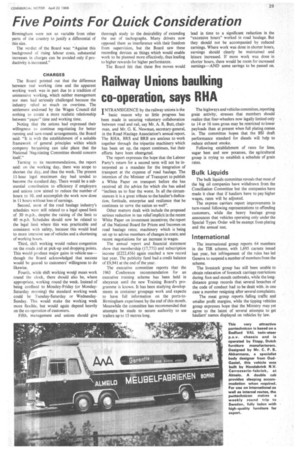Five Points For Quick Consideration
Page 31

If you've noticed an error in this article please click here to report it so we can fix it.
Birmingham were not so variable from other parts of the country to justify a differential of this size.
The verdict of the Board was: "Against this background of rising labour costs, substantial increases in charges can be avoided only if productivity is increased."
CHARGES
The Board pointed out that the difference between real working time and the apparent working week was in part due to a tradition of unintensive working, which neither management nor men had seriously challenged because the industry relied so much on overtime. The settlement endorsed by the Wages Council did nothing to create a more realistic relationship between -paper" time and working time.
Noting that the unions had expressed their willingness to continue negotiating for better running and turn-round arrangements, the Board said: "It is with the establishment of a suitable framework of general principles within which company bargaining can take place that the National Negotiating Committee should concern itself."
Turning to its recommendations, the report said: on the working day, there was scope to shorten the day, and thus the week. The present 11-hour legal maximum day had tended to become the standard .day. There would be a substantial contribution to efficiency if employers and unions now aimed to reduce the number of hours to 10, and accomplish the work now done in 11 hours without loss of earnings.
Second, most of the road haulage industry's schedules were still related to a legal speed limit of 30 m.p.h., despite the raising of the limit to 40 m.p.h. Schedules should now be related to the legal limit where this was practicable and consistent with safety, because this would lead to more intensive use of vehicles and a shortening of working hours.
Third, shift working would reduce congestion on the roads and at pick-up and dropping points. This would produce major gains in vehicle use— though the Board acknowledged that success would be geared to customers' willingness to do likewise.
Fourth, while shift working would mean work round the clock, there should also be, where appropriate, working round the week. Instead of being confined to Monday-Friday (or MondaySaturday morning) the standard working week could be Tuesday-Saturday or WednesdaySunday. This would make the working week more flexible, but would again depend heavily on the co-operation of customers.
Fifth, management and unions should give thorough study to the desirability of extending the use of tachographs. Many drivers now opposed them as interference with their freedom from supervision, but the Board saw these recording devices as things which would enable work to be planned more effectively, thus leading to higher rewards for higher performance.
The Board felt that these five moves would lead in time to a significant reduction in the "exceSsive hours" worked in road haulage. But they should not be accompanied by reduced earnings. Where work was done in shorter hours, earnings should clearly be maintained and leisure increased. If more work was done in shorter hours, there would be room for increased earnings—AND some savings to be passed on.




























































































































